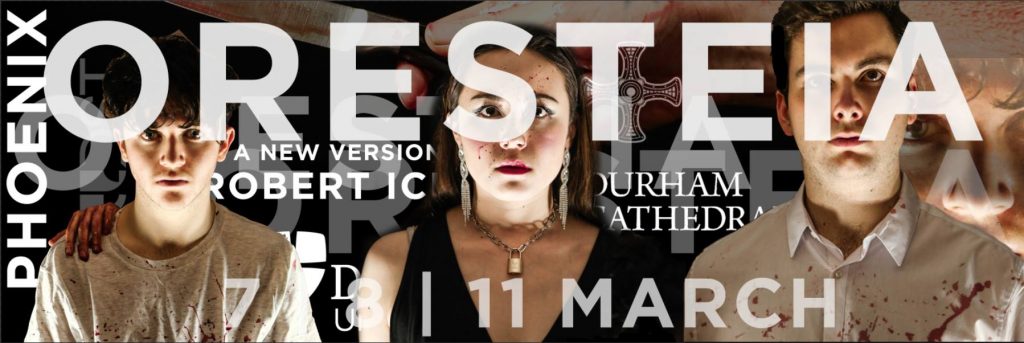
Credit: Phoenix Theatre
Oresteia is no small feat for a student theatre production to take on. It is grand in all senses: at three hours long, with fathers poisoning daughters, wives stabbing husbands, and sons avenging fathers, Aeschylus’ epic demands a great deal from its cast. And it is epic. While it is undeniably a very long play, with two intervals and five acts, the cast manage to sustain their momentum and enthusiasm throughout, and the tension rarely falters.
Oresteia is the first play to be performed in the Chapter House at Durham Cathedral for over five years. Here, appeals to the gods do not seem too far-fetched. It is a suitably grand setting for this production, and the lofty roof and the tolling of the bells add to the grave atmosphere. At times, this venue does pose a challenge to the cast, and not all of the lines can be heard clearly. In scenes of catharsis, however, the acoustics of the Chapter House serve the cast well – one notable instance is Clytemnestra’s scream when she learns of the death of her daughter. It’s a chilling noise, one that this setting does little to soften.
This is a relatively large cast for a student production, but each member has their share of memorable moments. Fionna Monk is the very picture of a grieving and furious mother in her role as Clytemnestra. Firm and assured, yet also convincingly hysterical, she dominates the stage. Complex female characters are always welcome and refreshing, and despite the fact that Oresteia is around 2,500 years old, Clytemnestra’s strength and murderous rage is as strangely alluring as ever. Jack Palmer’s Agamemnon, here a Blairite politician, is surprisingly human. His decision to murder his daughter is the focus of the first act, and we see him as he grapples with this moral dilemma. Ultimately, he chooses his country, but returns back from the war less heroic, and more pathetic. It’s a complex portrayal of a man that could easily be performed as wholly villainous, and Palmer captures these nuances well.
Jack Firoozan is equally convincing as the tormented Orestes. He fully settles into his role in the latter half of the play, as his mental state declines and he is tortured by thoughts of killing his mother. The theme of mental health was explicit in this production: Firoozan holds his head in his hands as he tries to explain his dreams to therapist Lydia Cook, and a Fury that nobody else can see follows him around the stage. This focus gives a whole new dimension to the play, and Firoozan plays a young man’s descent with heartbreaking authenticity.
Auguste Voulton is charismatic as an off-stage commentator, and his breaking of the fourth wall is successful in maintaining the audience’s attention in the fourth act, when he asks us to decide for ourselves whether or not Orestes is guilty. This play is an unflinching examination of human brutality, morality and conflict, and Voulton’s question demands that we consider our own beliefs.
While this production is set in the present day, with news interviews, modern language and current music, it does not stray so far from the original that it loses the great cathartic impact of Greek theatre. A perfect balance is achieved between honouring the ancient while highlighting themes that remain pertinent today. It is not hard to see our current political landscape reflected in the conflict and confusion that are, ultimately, never entirely resolved.
To even attempt an amateur production of a drama of such epic proportions is an achievement in itself, but Yule and the cast rise to the challenge. Phoenix Theatre Company’s production of Oresteia is a harrowing yet worthy watch.
Phoenix Theatre’s Oresteia is on 7th, 8th and 11th March at 7:30pm in Durham Cathedral.
